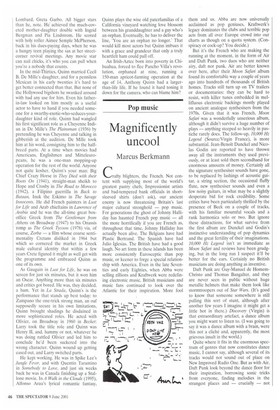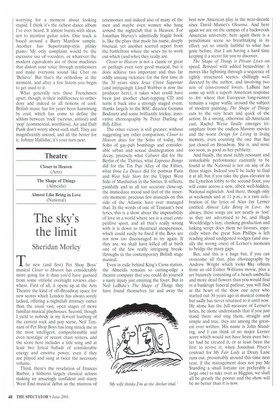Magnificently uncool
Marcus Berkmann
Crafty blighters, the French. Not content with supplying most of the world's greatest pastry chefs, Impressionist artists and bad-tempered bank officials in shortsleeved shirts (don't ask), our ancient enemy is now threatening Britain's last major cultural stronghold — pop music. For generations the ghost of Johnny Halliday has haunted French pop music — all the more horrifically if you are French as, throughout that time, Johnny Halliday has actually been alive. The Belgians have had Plastic Bertrand. The Spanish have had Julio Iglesias. The British have had a good laugh. No art form in these islands has been more consistently Eurosceptic than pop music, or keener to forge a special relationship with America. Even in the late Seventies and early Eighties, when Abba were selling zillions and Kraftwerk were redefining electronic music, British musicians and music fans continued to look over the Atlantic for their inspiration. More fool
them and us. Abba are now universally acclaimed as pop geniuses, Kraftwerk's legacy dominates the clubs and terrible pop acts from all over Europe crowd into our charts as though on a quota system. (Conspiracy or cock-up? You decide.) But it's the French who are making the running at the moment, in the form of Air and Daft Punk, two duos who are neither airy, daft nor punk. Air are better known over here, after their Moon Safari album found its comfortable way a couple of years ago into hundreds of thousands of British homes. Tracks still turn up on TV trailers or documentaries: they can be hard to resist, with killer tunes embedded in mellifluous electronic backings mostly played on ancient analogue synthesisers from the 1970s. Given that it was French, Moon Safari was a wonderfully unserions album, although it didn't survive a huge number of plays — anything steeped so heavily in pastiche rarely does. The follow-up, 10,000 Hz Legend (Source/Virgin France), is more substantial. Jean-Benoit Dunckel and Nicolas Godin are reported to have thrown away all the instruments they used previously, or at least sold them secondhand for enormous amounts of money. Certainly all the signature synthesiser sounds have gone, to be replaced by lashings of acoustic guitar, a string section, the occasional fluffy flute, new synthesiser sounds and even a few noisy guitars, in what may be a slightly desperate bid for rock credibility. Some critics have been particularly thrilled by the presence of Beck on a couple of tracks, with his familiar mournful vocals and a rank harmonica solo or two. But ignore these distractions, for what survive from the first album are Dunckel and Godin's instinctive understanding of pop dynamics and the great fertility of their imaginations. 10,000 Hz Legend isn't as immediate as Moon Safari and reviews have been grudging, but in the long run I suspect it'll be better for the ears. Certainly no British musicians are doing anything as inventive.
Daft Punk are Guy-Manuel de HomemChrist° and Thomas Bangalter, and they are never seen in public without huge metallic helmets that make them look like stormtroopers out of Star Wars. (It's good to know that someone somewhere is still pulling this sort of stunt, although after another few years I imagine it might get a little hot in there.) Discovery (Virgin) is that extraordinary artefact, a dance album you might want to listen to. (I was going to say it was a dance album with a brain, were this not a cliche and, apparently, the most grievous insult in the world.) Quite where it fits in the enormous spectrum of genres that now constitutes dance music, I cannot say, although several of its tracks would not sound out of place on New Improved Radio One. But as with Air, Daft Punk look beyond the dance floor for their inspiration, borrowing sonic tricks from everyone, finding melodies in the strangest places and — crucially — not worrying for a moment about looking stupid. I think it's the richest dance album I've ever heard. It almost bursts with ideas, not to mention guitar solos. One track is based around a Barry Manilow sample. Another has Supertramp-style plinky piano. My only complaint would be the excessive use of vocoders, or whatever the modern equivalents are of those machines that distort your voice through synthesisers and make everyone sound like Cher on 'Believe'. But that's the orthodoxy at the moment, and after a few listens you begin to get used to it.
What generally sets these Frenchmen apart, though, is their indifference to orthodoxy and indeed to all notions of cool. British music has for years been hamstrung by cool, which has come to define the schism between 'rock' (serious, artistic) and 'pop' (commercial, worthless). Air and Daft Punk don't worry about such stuff. They are magnificently uncool, and all the better for it. Johnny Halliday, it's your turn next.



































































 Previous page
Previous page